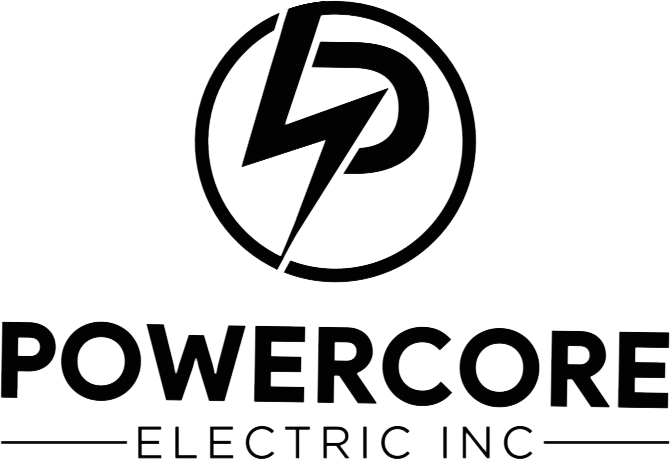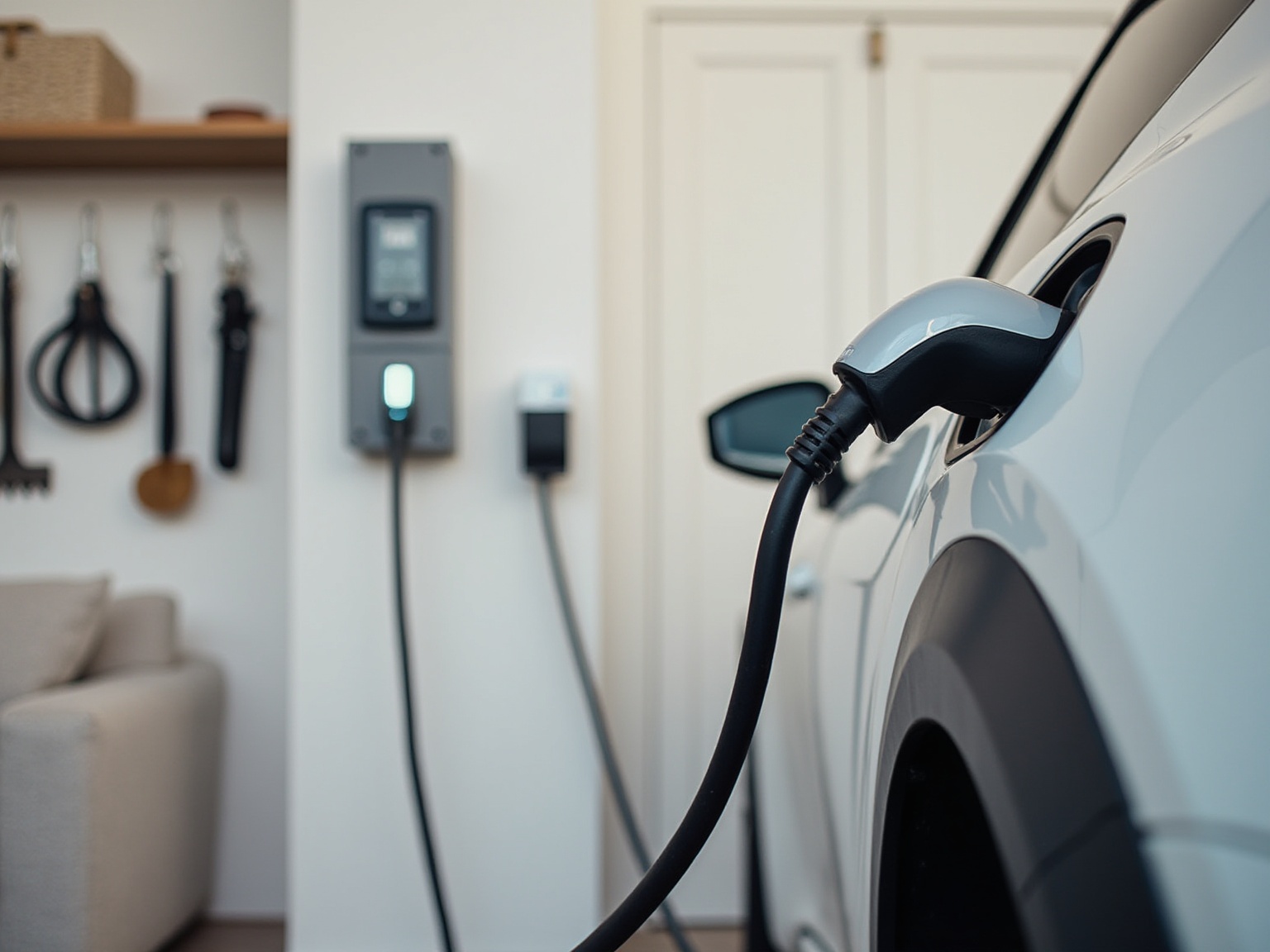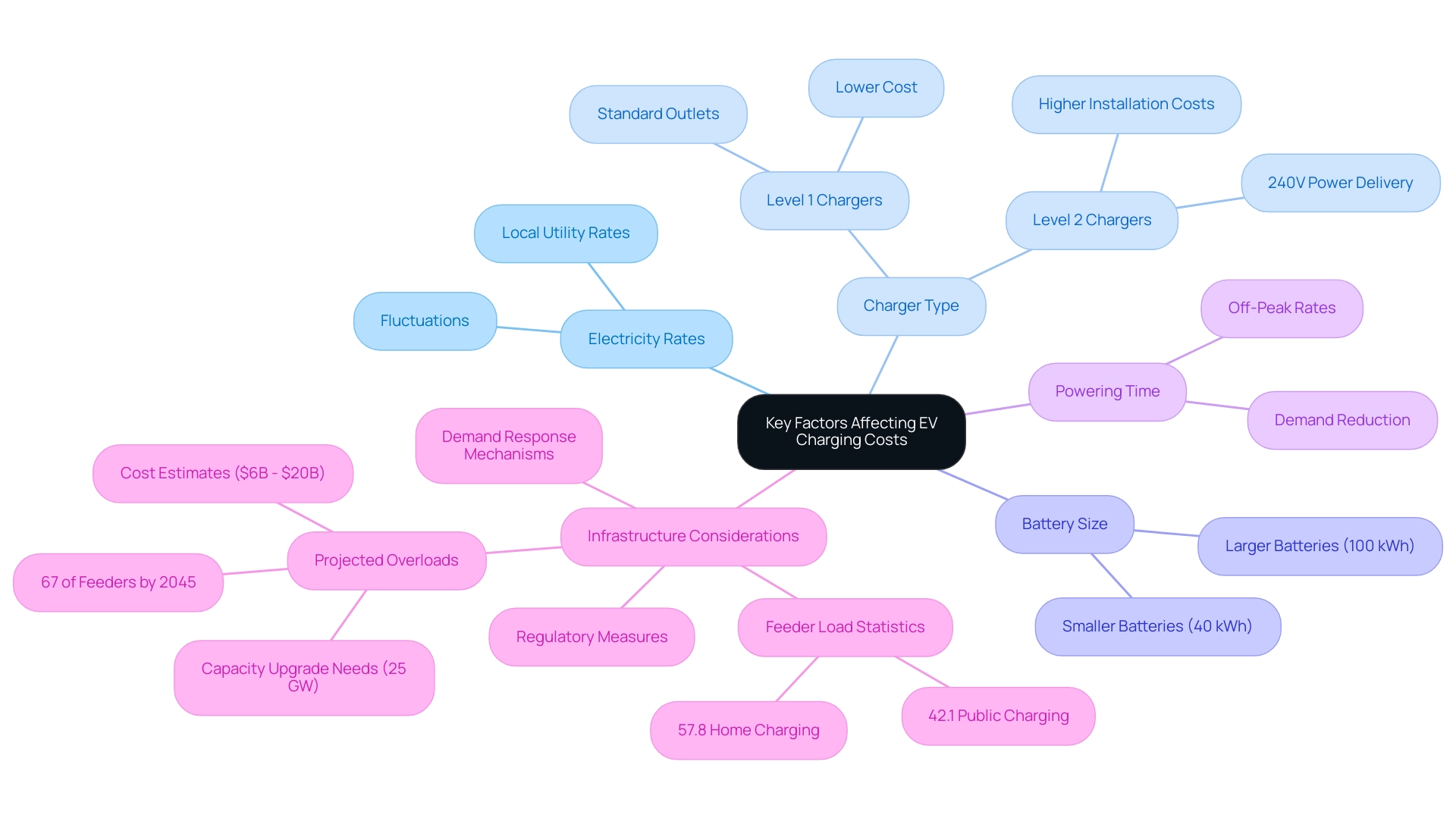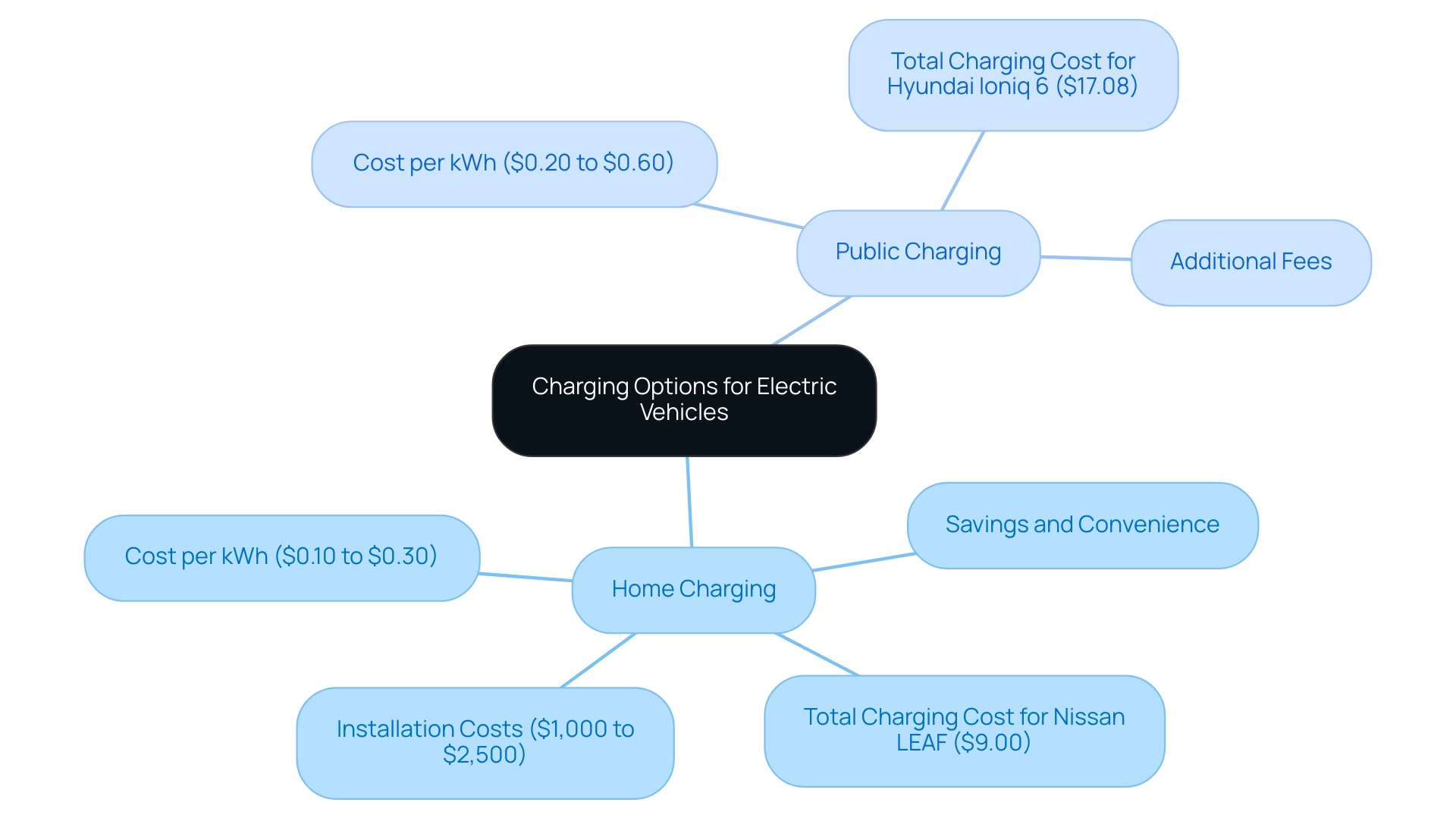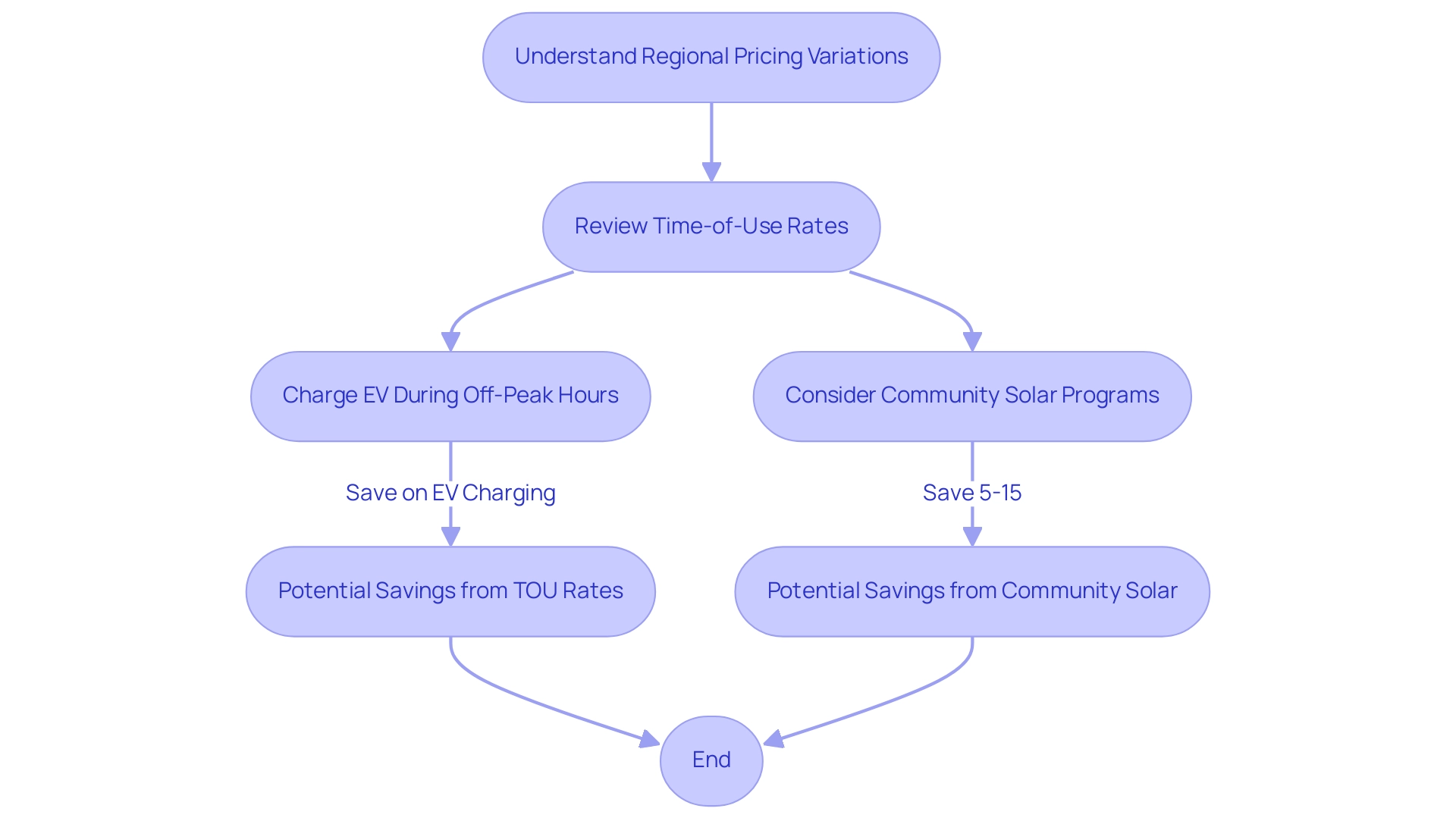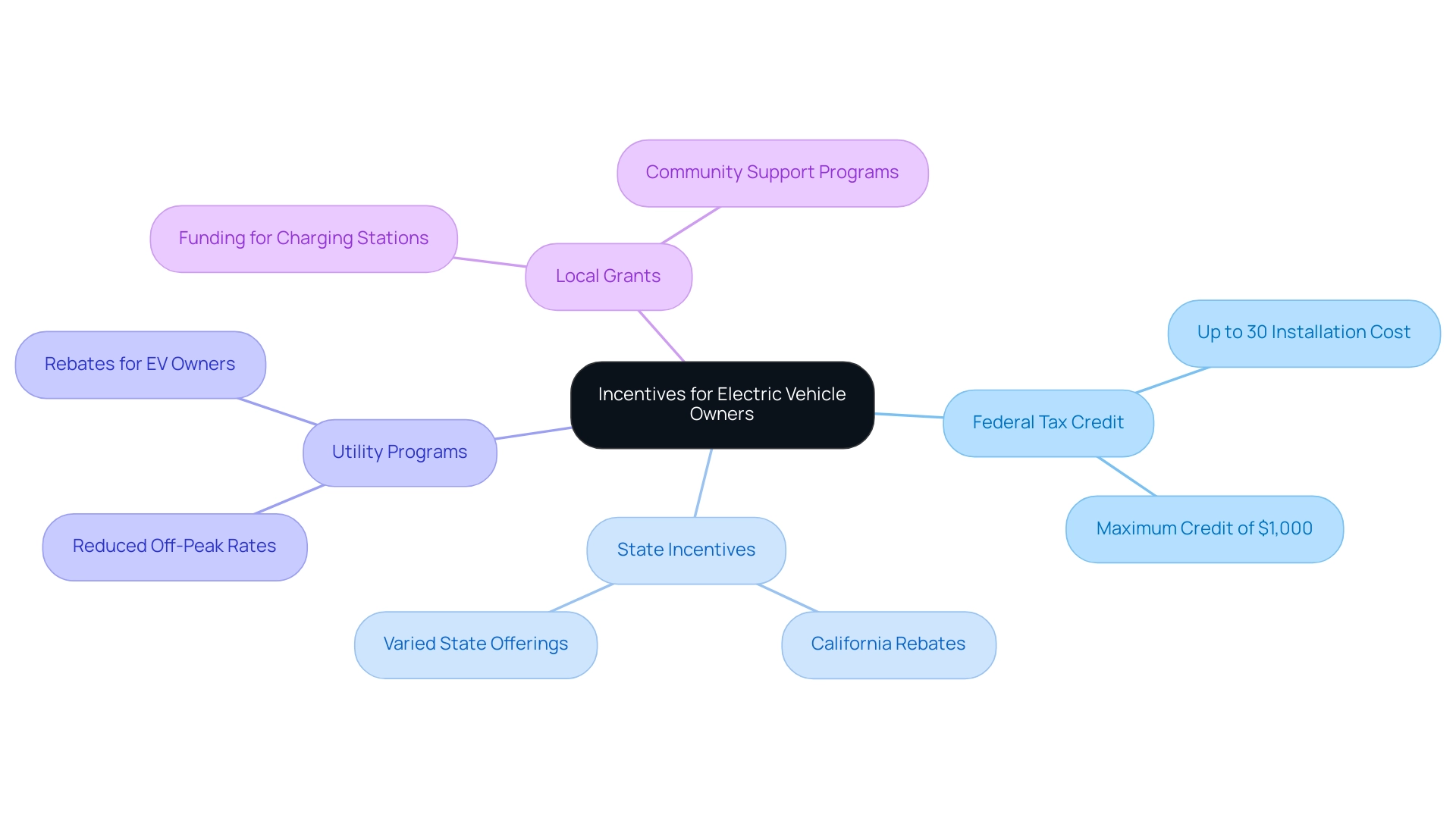Overview
We understand that concerns about energy bills can weigh heavily on your mind. Electric car charger prices can indeed be influenced by various factors, such as local electricity rates, charger type, and battery size. Typically, home charging costs range from $0.10 to $0.30 per kilowatt-hour. It’s common to feel overwhelmed by these expenses, but let’s explore how these variables can actually lead to significant savings.
Many EV owners find that despite higher electricity bills, they enjoy substantial savings on fuel and maintenance compared to traditional vehicles. Together, we can navigate these choices and embrace the benefits of energy independence. By considering the shift to electric vehicles, you not only contribute to a more sustainable future but also empower yourself with financial advantages.
Let’s work towards a greener tomorrow, one charge at a time.
Introduction
As electric vehicles (EVs) continue to gain traction in the automotive landscape, we understand that the nuances of charging costs can feel overwhelming for potential owners. It’s common to worry about fluctuating electricity rates and the type of charging station used; various factors can dramatically influence the expenses associated with keeping an EV powered.
This article delves into the intricacies of electric car charging costs, comparing home charging to public stations, exploring regional price variations, and highlighting available incentives that can ease the financial burden.
By equipping you with the knowledge needed to navigate these complexities, we aim to empower you to make informed decisions and optimize your charging strategies for both convenience and savings.
Together, we can work towards a more sustainable future.
Understanding the Basics of Electric Car Charging Costs
We understand that expenses for electric car refueling can be a significant concern, influenced by various factors such as local electricity rates, the type of charger used, and the battery capacity of your vehicle. As of 2025, the typical expense to recharge an electric automobile (EV) at home ranges from $0.10 to $0.30 per kilowatt-hour (kWh). For instance, replenishing an automobile with a 60 kWh battery from empty to full may result in expenses between $6 and $18, depending on the current electricity prices in your region.
In California, where electricity prices are notably high, homeowners can expect to pay an average of $0.25 per kWh. This translates to approximately $15 for a full charge of a 60 kWh battery. However, many EV owners find that despite the rise in their electricity bills, their overall transportation expenses decrease significantly.
For example, powering a 2024 Kia EV9 GT-Line four times a week can add about $271.73 to the monthly electricity expense. Yet, this is often balanced by savings on fuel and maintenance compared to traditional gasoline vehicles. To put this into perspective, driving 100 miles in a Toyota RAV4 Hybrid amounts to around $7.87, highlighting the efficiency and cost-effectiveness of electric vehicles.
Moreover, the type of charger you choose plays a crucial role in determining the electric car charger price. Level 1 chargers, utilizing a standard household outlet, are slower and may take longer to fully power an EV, while Level 2 chargers, which require a dedicated circuit, can replenish energy more quickly and efficiently. This can significantly reduce overall charging time and costs. Fast-charging compatibility is also essential for EVs, allowing for quicker recharging on the go, making it a vital consideration for potential buyers.
At Powercore Electric, we specialize in the installation of EV charging stations, ensuring a seamless process that includes a thorough site assessment, necessary electrical upgrades, and rigorous testing to guarantee optimal functionality. Together, we can enhance your energy efficiency and savings.
Additionally, we offer solar panels and battery backup solutions that can further improve your energy independence. Understanding these variables is crucial for efficient budgeting and maximizing savings when transitioning to electric transportation. As Chris Hardesty noted, the 2025 Ford Maverick combines truck utility with hybrid efficiency, reflecting the evolving landscape of electric and hybrid vehicles.
As the market evolves, staying informed about the latest advancements in power technology and electricity rates will empower you to make the most cost-effective choices for your energy needs. Let’s work towards a more sustainable future together.
Key Factors Affecting the Cost to Charge Your Electric Vehicle
Several key factors significantly influence the cost of charging your electric vehicle, and we understand that navigating these can feel overwhelming:
- Electricity Rates: Local utility rates can vary considerably, directly impacting your overall charging expenses. It’s essential to consult your utility provider for specific rates, as fluctuations can lead to substantial differences in the electric car charger price and your monthly expenses.
- Charger Type: The selection between Level 1 and Level 2 chargers significantly influences expenses. Level 1 chargers, which utilize standard outlets, are generally more affordable but provide slower power delivery speeds. In contrast, Level 2 chargers (240V) offer quicker power delivery capabilities, but the electric car charger price may involve higher installation expenses, making it essential to evaluate the advantages against this initial investment.
- Battery Size: The size of your vehicle’s battery is another critical factor. Larger batteries, such as a 100 kWh pack, require more energy to charge compared to smaller ones, like a 40 kWh battery. This heightened energy demand results in increased expenses for powering, particularly in areas with high electricity rates, where the electric car charger price can also contribute to overall costs.
- Powering Time: Timing your power sessions can lead to significant savings. Numerous utility providers offer reduced rates during off-peak times, enabling you to decrease expenses by powering your vehicle when demand is diminished. This strategy not only saves money but also helps alleviate strain on the electrical grid, which is projected to face challenges due to rising EV adoption. A recent study suggests that by 2045, 67% of feeders in California might be overloaded due to EV power demand, requiring a capacity upgrade of 25 GW at an estimated expense between $6 billion and $20 billion. Significantly, 57.8% of the feeders are influenced by residential power usage, highlighting the significance of home energy in the broader framework of EV expenses.
Comprehending these elements can empower you to make educated choices regarding your electric vehicle power strategy, which can influence the electric car charger price, ultimately resulting in savings and a more efficient energy consumption. Additionally, as highlighted in the case study ‘Sensitivity Analysis of EV Impact,’ managing EV usage behavior is crucial to mitigate infrastructure strain. Furthermore, regulatory measures and demand response mechanisms will play a vital role in addressing the expected challenges on the distribution network.
In a wider context, nations such as Sweden and France are progressing with their electrification strategies, which may indirectly affect local pricing and infrastructure development.
To further support you in handling your EV expenses, consider Powercore Electric’s services, including solar panel installation and battery backup solutions. For more information, feel free to contact us at ryan.serrano@powercoreinc.net or call (916) 699-8778. As one satisfied customer, Tom, noted, “Highly recommend!! Exceptional service and price. Tom was very helpful, a really nice straightforward guy who definitely cares about his clients.
Comparing Home Charging Costs to Public Charging Stations
Powering an electric vehicle (EV) at home often proves to be more cost-effective than relying on public charging stations. We understand that managing energy bills can be a concern, and the typical expense for residential recharging ranges from $0.10 to $0.30 per kilowatt-hour (kWh)—significantly less than the $0.20 to $0.60 per kWh charged at public stations. Additionally, public access points frequently come with extra fees, such as connection charges or time-related costs, which can further inflate your overall expenditure.
For instance, charging a 2025 Nissan LEAF for six hours at home, assuming a rate of $1.50 per hour, totals approximately $9.00. In contrast, a case study from Louisiana reveals that charging the 2025 Hyundai Ioniq 6 for 100 miles at home costs only $2.68, while rapid refueling can escalate to $17.08 for the same distance. This stark difference underscores the significant savings associated with residential power supply compared to traditional gasoline vehicles.
Investing in a home EV charging station not only reduces costs but also enhances convenience for frequent EV users, particularly environmentally-conscious homeowners who value sustainability. The price of installing a Tesla Level 2 charger typically ranges from $1,000 to $2,500, depending on installation complexity and local electrical requirements. As energy costs fluctuate, especially in regions that previously enjoyed lower rates—now seeing an average rise of 6.5% in recent months—the financial advantages of home power supply become even clearer.
Conversely, states with higher initial prices have experienced a slight decrease of 0.4% on average, complicating the public infrastructure landscape.
Powercore Electric offers tailored solutions for homeowners looking to install Tesla Level 2 chargers, while being mindful of the electric car charger price to ensure exceptional quality and a customer-first approach. Our deep understanding of California’s energy needs allows us to provide sustainable energy solutions that enhance savings and efficiency, including the integration of solar energy systems that can further decrease expenses.
Expert insights consistently highlight the long-term savings potential of home power stations. Nick Kurczewski, a car journalist, wisely advises, “Always ask before plugging in!” This insight emphasizes the importance of being aware of the costs associated with charging.
By transitioning to home power solutions, EV owners can effectively manage their energy expenses while contributing to a more sustainable energy future. Together, we can create a greener tomorrow.
Regional Pricing Variations and Time-of-Use Rates Explained
In California, the variability of electricity prices can be a source of concern for many homeowners. These prices fluctuate significantly by region, influenced by local energy policies, demand changes, and supply dynamics. As we look towards 2025, the average electricity price in California is approximately 30.95¢ per kWh, leading to an average monthly bill of around $161. This figure is notably higher than the national average, making it essential for homeowners to adopt strategic energy usage habits, especially when considering the costs associated with charging electric vehicles (EVs).
Many utility companies in California offer time-of-use (TOU) rates, which can be a valuable opportunity for consumers to lower their electricity expenses during off-peak hours, typically at night. By charging your EV during these designated times, you can significantly reduce your energy bills. For example, engaging in community solar programs can lead to savings of 5-15% on electricity costs, translating to an average annual saving of $358 for those achieving a 10% reduction.
At Powercore Electric, we understand the importance of community and are here to assist homeowners in navigating these programs. Our goal is to help you comprehend how to leverage these opportunities, ensuring you can optimize your savings while embracing electric transport technology.
Real-life examples illustrate how TOU rates can impact EV charging costs. Homeowners who consider the timing of their electric car charger usage can save significantly on their monthly bills by charging during off-peak hours, especially when compared to peak hours, where rates soar. This thoughtful approach not only helps manage expenses but also encourages a more sustainable energy usage pattern.
Moreover, regional variations in electricity pricing for EV charging can further influence the costs associated with electric car chargers. Areas experiencing higher demand may face elevated rates, while regions rich in renewable energy sources often provide more competitive pricing. Powercore Electric’s expertise in local energy dynamics can support homeowners in navigating these fluctuations, ensuring that you can manage your energy expenses effectively.
Our extensive offerings, including solar panels, battery backups, and EV power stations, combined with our commitment to transparency and personalized service, position us as a trusted partner for environmentally conscious homeowners seeking to address rising energy costs with sustainable solutions. Together, we can work towards a brighter, more energy-independent future.
Installation Costs for Home EV Charging Stations: What to Expect
When considering the installation of a home EV refueling station, many homeowners understandably worry about the costs involved. The price of an electric car charger can vary significantly, typically ranging from $1,000 to $3,000, not including the cost of the station itself. Understanding the factors that influence this price is essential for making an informed investment.
- Charger Type: One of the primary considerations is the type of charger. Choosing between Level 1 and Level 2 chargers can greatly impact installation costs. Level 1 chargers, which simply plug into a standard outlet, tend to be more budget-friendly. However, if you opt for a Level 2 charger, which offers faster charging, be prepared for potentially higher installation costs due to the need for additional electrical work.
- Electrical Capacity: Another factor to consider is your home’s current electrical capacity. If your home is already equipped with a sufficient electrical system, installation expenses may be lower. Conversely, homes that require upgrades to handle the additional load will incur higher costs. At Powercore Electric, we specialize in evaluating your property’s electrical infrastructure to ensure that any necessary upgrades are identified, paving the way for a smooth installation process.
- Labor Costs: It’s also crucial to engage a qualified electrician for a safe and compliant installation. Labor costs can fluctuate between $100 to $350, depending on the complexity of the installation and local rates. Our team at Powercore Electric is dedicated to providing high-quality installations, giving you peace of mind as you embark on this journey.
- Permits: In some areas, obtaining permits for installation is mandatory, which can further increase overall expenses. We encourage homeowners to check local regulations for any permit requirements and to explore available rebates or incentives from local government entities and utilities that can help lessen the financial burden. For instance, homeowners in Bakersfield may find specific programs aimed at promoting renewable energy adoption, significantly reducing the costs associated with installing an EV charger.
By grasping these financial incentives, you can make educated decisions regarding the electric car charger price while investing in an EV charger. As the demand for electric transportation solutions continues to grow, careful planning of your electrical infrastructure becomes increasingly important. Partnering with professionals, like those at Powercore Electric, ensures that you receive expert guidance tailored to your unique needs.
This commitment to quality not only leads to a successful and cost-effective installation but also makes home EV power supply a simple and economically sensible solution for eco-conscious homeowners. Together, we can navigate this exciting transition towards sustainable energy solutions.
Exploring Savings and Incentives for Electric Vehicle Owners
As an electric transport (EV) owner, you may find yourself navigating the complexities of charging station costs. Fortunately, a range of incentives provided by federal and state authorities can significantly reduce the price of electric car chargers. Here are some key incentives available in 2025 that can ease your transition:
- Federal Tax Credit: Homeowners can take advantage of a tax credit of up to 30% of the installation costs for EV chargers, with a maximum credit of $1,000. This incentive not only offers immediate savings but also makes the shift to electric vehicles more financially feasible when considering the costs associated with electric car chargers.
- State Incentives: States like California provide various rebates and tax credits for both EV purchases and the installation of charging stations. These incentives can differ widely, so it’s essential to research the specific offerings in your area to maximize your benefits.
- Utility Programs: Many utility companies have launched special programs or rebates for EV owners. These may include reduced rates for electricity usage during off-peak hours, leading to substantial savings on your bills.
- Local Grants: Don’t overlook local grants or funding opportunities that may be available to support the installation of EV refueling infrastructure. These grants can further alleviate the financial burden associated with electric car chargers for setting up a home charging station.
Real-life examples illustrate the impact of these incentives. For instance, registered dealers facilitating the transfer of clean auto tax credits at the time of sale can enhance their sales while providing immediate benefits to customers. This process not only promotes the adoption of electric transportation but also underscores the importance of understanding the available incentives.
As Randy Young, Director of Marketing and Data Solutions, wisely advises, “Make sure to investigate all possible rebates and incentives when evaluating EVSE projects.” This serves as a gentle reminder for homeowners to stay informed about current incentives.
At Powercore Electric, we are locally owned and community-centered, dedicated to helping you navigate these incentives and maximize your savings. With over 30 years of experience serving California, we offer a variety of services, including solar panels, battery backups, and EV power stations, ensuring you receive expert guidance and support. As the landscape for electric vehicle ownership evolves, staying informed about current incentives is crucial.
We encourage you to explore all possible rebates and incentives when evaluating the electric car charger prices for your EV charging projects. Together, we can maximize your savings and contribute to a more sustainable future.
Conclusion
Understanding the costs associated with electric vehicle (EV) charging is crucial for potential owners navigating this evolving landscape. We understand that concerns about energy bills can be daunting, and our analysis reveals several key factors influencing charging expenses, including:
- Local electricity rates
- The type of charging station
- The size of the vehicle’s battery
Home charging typically offers significant savings compared to public stations, highlighting the financial advantages of investing in a home charging solution.
Moreover, regional pricing variations and time-of-use rates can further optimize charging costs. This allows homeowners to strategically charge their vehicles during off-peak hours for added savings. While installation costs for home EV charging stations can vary, understanding the factors at play—such as the charger type, electrical capacity, and available incentives—can empower homeowners to make informed decisions.
Incentives from federal and state governments can also alleviate the financial burden of transitioning to electric vehicles, making it a more feasible option for many. By taking advantage of these incentives and understanding the nuances of charging costs, EV owners can navigate their energy expenses effectively.
As the shift towards electric vehicles accelerates, being informed about these aspects not only enhances personal savings but also contributes to a more sustainable energy future. Embracing electric vehicle technology is an essential step towards reducing environmental impact while enjoying the long-term benefits of efficient and cost-effective transportation. Together, we can make this transition smoother and more beneficial for everyone involved.
